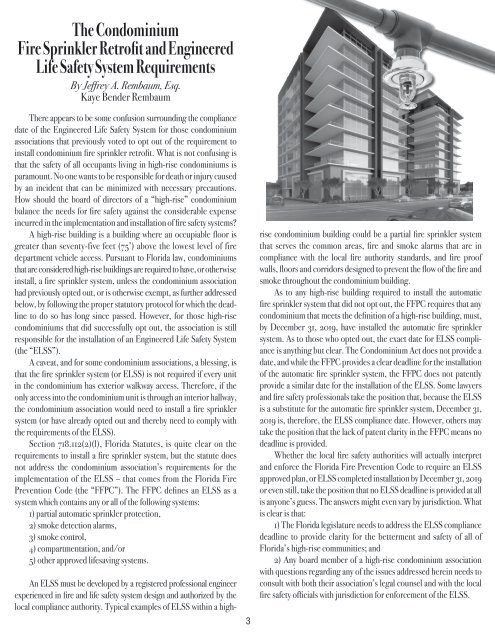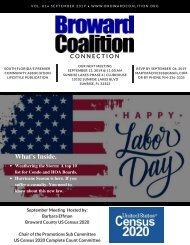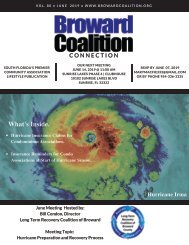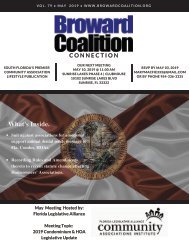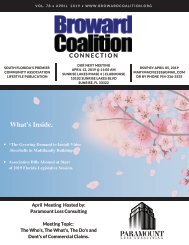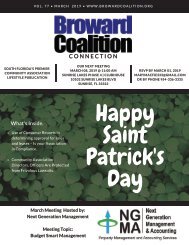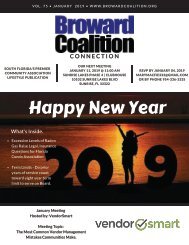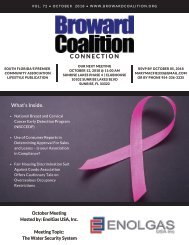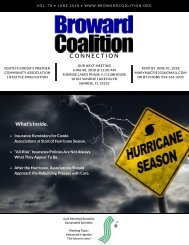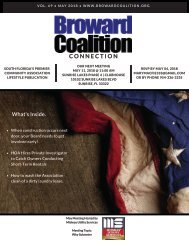December 2018 Newsletter
Create successful ePaper yourself
Turn your PDF publications into a flip-book with our unique Google optimized e-Paper software.
The Condominium<br />
Fire Sprinkler Retrofit and Engineered<br />
Life Safety System Requirements<br />
By Jeffrey A. Rembaum, Esq.<br />
Kaye Bender Rembaum<br />
There appears to be some confusion surrounding the compliance<br />
date of the Engineered Life Safety System for those condominium<br />
associations that previously voted to opt out of the requirement to<br />
install condominium fire sprinkler retrofit. What is not confusing is<br />
that the safety of all occupants living in high-rise condominiums is<br />
paramount. No one wants to be responsible for death or injury caused<br />
by an incident that can be minimized with necessary precautions.<br />
How should the board of directors of a “high-rise” condominium<br />
balance the needs for fire safety against the considerable expense<br />
incurred in the implementation and installation of fire safety systems?<br />
A high-rise building is a building where an occupiable floor is<br />
greater than seventy-five feet (75’) above the lowest level of fire<br />
department vehicle access. Pursuant to Florida law, condominiums<br />
that are considered high-rise buildings are required to have, or otherwise<br />
install, a fire sprinkler system, unless the condominium association<br />
had previously opted out, or is otherwise exempt, as further addressed<br />
below, by following the proper statutory protocol for which the deadline<br />
to do so has long since passed. However, for those high-rise<br />
condominiums that did successfully opt out, the association is still<br />
responsible for the installation of an Engineered Life Safety System<br />
(the “ELSS”).<br />
A caveat, and for some condominium associations, a blessing, is<br />
that the fire sprinkler system (or ELSS) is not required if every unit<br />
in the condominium has exterior walkway access. Therefore, if the<br />
only access into the condominium unit is through an interior hallway,<br />
the condominium association would need to install a fire sprinkler<br />
system (or have already opted out and thereby need to comply with<br />
the requirements of the ELSS).<br />
Section 718.112(2)(l), Florida Statutes, is quite clear on the<br />
requirements to install a fire sprinkler system, but the statute does<br />
not address the condominium association’s requirements for the<br />
implementation of the ELSS – that comes from the Florida Fire<br />
Prevention Code (the “FFPC”). The FFPC defines an ELSS as a<br />
system which contains any or all of the following systems:<br />
1) partial automatic sprinkler protection,<br />
2) smoke detection alarms,<br />
3) smoke control,<br />
4) compartmentation, and/or<br />
5) other approved lifesaving systems.<br />
3<br />
An ELSS must be developed by a registered professional engineer<br />
experienced in fire and life safety system design and authorized by the<br />
local compliance authority. Typical examples of ELSS within a highrise<br />
condominium building could be a partial fire sprinkler system<br />
that serves the common areas, fire and smoke alarms that are in<br />
compliance with the local fire authority standards, and fire proof<br />
walls, floors and corridors designed to prevent the flow of the fire and<br />
smoke throughout the condominium building.<br />
As to any high-rise building required to install the automatic<br />
fire sprinkler system that did not opt out, the FFPC requires that any<br />
condominium that meets the definition of a high-rise building, must,<br />
by <strong>December</strong> 31, 2019, have installed the automatic fire sprinkler<br />
system. As to those who opted out, the exact date for ELSS compliance<br />
is anything but clear. The Condominium Act does not provide a<br />
date, and while the FFPC provides a clear deadline for the installation<br />
of the automatic fire sprinkler system, the FFPC does not patently<br />
provide a similar date for the installation of the ELSS. Some lawyers<br />
and fire safety professionals take the position that, because the ELSS<br />
is a substitute for the automatic fire sprinkler system, <strong>December</strong> 31,<br />
2019 is, therefore, the ELSS compliance date. However, others may<br />
take the position that the lack of patent clarity in the FFPC means no<br />
deadline is provided.<br />
Whether the local fire safety authorities will actually interpret<br />
and enforce the Florida Fire Prevention Code to require an ELSS<br />
approved plan, or ELSS completed installation by <strong>December</strong> 31, 2019<br />
or even still, take the position that no ELSS deadline is provided at all<br />
is anyone’s guess. The answers might even vary by jurisdiction. What<br />
is clear is that:<br />
1) The Florida legislature needs to address the ELSS compliance<br />
deadline to provide clarity for the betterment and safety of all of<br />
Florida’s high-rise communities; and<br />
2) Any board member of a high-rise condominium association<br />
with questions regarding any of the issues addressed herein needs to<br />
consult with both their association’s legal counsel and with the local<br />
fire safety officials with jurisdiction for enforcement of the ELSS.


